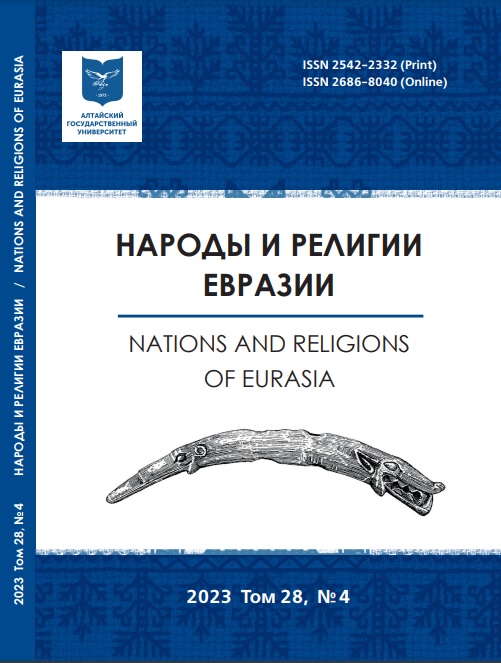Ambivalent attitude to “the world” in the organization Jehovah's Witnesses
Main Article Content
Abstract
At present time in the religious sphere we can see an abundance of religious movements. They compete with each other to attract new members. Some of them use an exclusivity strategy and oppose themselves to the “uninitiated” society. Such a worldview prism can take radical forms and increase the overall level of conflictogenicity. A good example are the Jehovah Witnesses. On the one hand, they are characterized by tendencies toward escapism. On the other hand, they are forced to remain in society for missionary service. In this article, the author analyzes the dogmatic reasons for the attitude towards the world, historical examples of ideological fluctuation, the social concept of Jehovah's Witnesses, and methods of correcting the worldview. Presumably, the main cause of tension with society is the eschatological views of the organization. This is why the leadership of Jehovah's Witnesses pays close attention to the topic of Armageddon.
Downloads
Metrics
Article Details

This work is licensed under a Creative Commons Attribution 4.0 International License.
References
Веснина Л. Е. Коммуникативная стратегия запугивания в текстах религиозной организации «Свидетели Иеговы» // Политическая лингвистика. 2012. № 2. С. 66-70.
Горюнов Д. В. К социальному учению «Свидетелей Иеговы» // Светско-религиозное взаимодействие в изменяющейся России: Всероссийская научная конференция, Белгород, 2004. С. 54-55.
Жуков А. В., Кондакова Н. С. Образ «вероотступника» в религиозной организации «Свидетели Иеговы» (на примере Забайкалья) // Известия Иркутского государственного университета. Серия: Политология. Религиоведение. 2012. № 2 (9), ч. 1. С. 190-195.
Орлов Д. К., Николаев Е. Л. Психологические взаимосвязи временной перспективы личности у свидетелей Иеговы // Вестник Чувашского университета. 2013. № 4. С. 213-216.
Попкова Л. М. Речевая манипуляция с использованием авторитетного источника // Вестник Псковского государственного университета. Серия: Социально-гуманитарные науки. 2011. № 15. С. 92-95.
Рутерфорд Д. Враги. Brooklyn, New York, U. S. A: Watchtower Bible and Tract Society, Inc. International Bible Students Association, 1937. 402 с.
Рутерфорд Д. Религия. Brooklyn, New York, U. S. A: Watchtower Bible and Tract Society, Inc. International Bible Students Association, 1940. 402 с.
Хазимуллин О. М., Дмитриева Л. Г. Психологические особенности методов вовлечения новых адептов в деструктивные группы // Высшее образование сегодня. 2020. № 8. С. 64-70.
Щеткин Ю. Ю. Социально-психологическая характеристика конфессии свидетелей Иеговы // Вестник Таганрогского института имени А. П. Чехова. 2010. № 2. С. 417-426.
Miller J. K. Damned If You Do, Damned If You Don't: Religious Shunning and the Free Exercise Clause // University of Pennsylvania Law Review, 1988. Vol. 137. No. 1, pp. 271-302 (на англ. яз.).
Sprague. T. D. The “World” Concept among Jehovah's Witnesses // The Harvard Theological Review, 1946. Vol. 39. No. 2, pp. 109-140 (на англ. яз.).
Penton M. J. Jehovah's Witnesses and the Secular State: A Historical Analysis of Doctrine // Journal of Church and State, 1979. Vol. 21. No. 1, pp. 55-72 (на англ. яз.).

